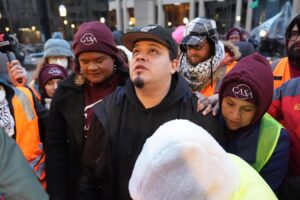
Open this photo in gallery:
The University of Toronto’s media-relations office said the institution acted on its own immediately once it learned of the faculty member’s comments.Nathan Denette/The Canadian Press
A University of Toronto professor whose social-media post after the assassination of American political activist Charlie Kirk was criticized by Ontario’s Minister of Colleges and Universities is now on leave, according to the university.
Ruth Marshall, an associate professor in religious studies and politics, has been placed on administrative leave, the University of Toronto’s faculty association confirmed Friday.
An account on X, apparently connected to Prof. Marshall, posted Wednesday afternoon that “shooting is honestly too good for so many of you,” using a profanity and describing the subjects as “fascist.”
The comment was posted a few hours after Mr. Kirk, a right-wing commentator and supporter of U.S. President Donald Trump, was shot and killed while speaking at a university campus in Utah on Wednesday.
Charlie Kirk’s videos thrived on controversy as he used the manosphere playbook to reshape politics
Nolan Quinn, Ontario Minister of Colleges and Universities, took issue with the comment. Mr. Quinn, in his own social-media post Thursday, said he had asked the University of Toronto to take action.
“Universities and their professors are supposed to foster critical thought, respectful debate, and be safe learning environments – and this professor’s violent rhetoric flagrantly flies in the face of that. I’ve been clear with the University of Toronto: they need to act,” Mr. Quinn said.
In a statement, the University of Toronto’s media-relations office said the institution acted on its own immediately once it learned of the faculty member’s comments.
“The university acted independently and apprised the government of its actions after they were complete. The matter is being looked into, and the university will not be commenting further.”
Prof. Marshall could not be reached for comment Friday. Webpages connected to Prof. Marshall on the U of T website were also not viewable and showed an “access denied” message.
Analysis: History doesn’t really repeat itself, but it can provide perspective in the Trump era
University professors are often shielded when making controversial public statements by the principle of academic freedom. According to the Canadian Association of University Teachers, the national umbrella group that represents university faculty, academic freedom includes the right to engage in rigorous debate and give voice to unpopular views on matters of public interest. However, it does have limits.
The CAUT policy describes a right “to contribute to social change through free expression of opinion on matters of public interest.” It also says that “academic staff must not suffer any institutional penalties because of the exercise of such rights.”
Mr. Quinn was not made available for an interview.
Terezia Zoric, president of the University of Toronto Faculty Association, said in a statement that the association is aware of the allegations and can confirm that the university’s administration has placed Prof. Marshall on administrative leave. Prof. Zoric said the association would not comment further.
In 2016, the U of T faced criticism when professor Jordan Peterson said in a video posted to social media that he would not use the genderless pronoun “they” if he was asked to do so by a student.
At the time, Dr. Peterson was quoted saying, “I think that people need to be able to say whatever they want no matter how outrageous.”
The Doug Ford government in 2018 mandated that all Ontario universities and colleges adopt a free-speech policy.





